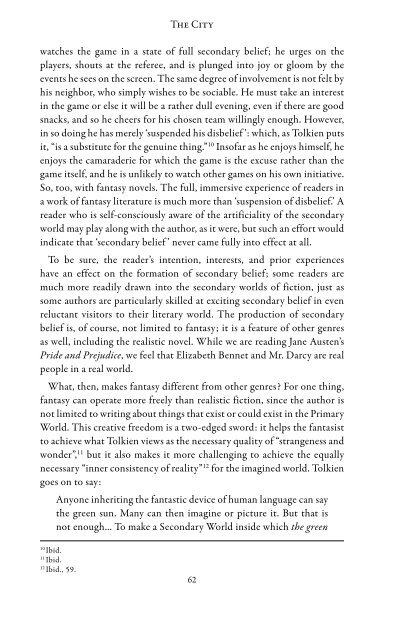THE CITY
h6c7p5d
h6c7p5d
Create successful ePaper yourself
Turn your PDF publications into a flip-book with our unique Google optimized e-Paper software.
The City<br />
watches the game in a state of full secondary belief; he urges on the<br />
players, shouts at the referee, and is plunged into joy or gloom by the<br />
events he sees on the screen. The same degree of involvement is not felt by<br />
his neighbor, who simply wishes to be sociable. He must take an interest<br />
in the game or else it will be a rather dull evening, even if there are good<br />
snacks, and so he cheers for his chosen team willingly enough. However,<br />
in so doing he has merely ‘suspended his disbelief ’: which, as Tolkien puts<br />
it, “is a substitute for the genuine thing.” 10 Insofar as he enjoys himself, he<br />
enjoys the camaraderie for which the game is the excuse rather than the<br />
game itself, and he is unlikely to watch other games on his own initiative.<br />
So, too, with fantasy novels. The full, immersive experience of readers in<br />
a work of fantasy literature is much more than ‘suspension of disbelief.’ A<br />
reader who is self-consciously aware of the artificiality of the secondary<br />
world may play along with the author, as it were, but such an effort would<br />
indicate that ‘secondary belief ’ never came fully into effect at all.<br />
To be sure, the reader’s intention, interests, and prior experiences<br />
have an effect on the formation of secondary belief; some readers are<br />
much more readily drawn into the secondary worlds of fiction, just as<br />
some authors are particularly skilled at exciting secondary belief in even<br />
reluctant visitors to their literary world. The production of secondary<br />
belief is, of course, not limited to fantasy; it is a feature of other genres<br />
as well, including the realistic novel. While we are reading Jane Austen’s<br />
Pride and Prejudice, we feel that Elizabeth Bennet and Mr. Darcy are real<br />
people in a real world.<br />
What, then, makes fantasy different from other genres? For one thing,<br />
fantasy can operate more freely than realistic fiction, since the author is<br />
not limited to writing about things that exist or could exist in the Primary<br />
World. This creative freedom is a two-edged sword: it helps the fantasist<br />
to achieve what Tolkien views as the necessary quality of “strangeness and<br />
wonder”, 11 but it also makes it more challenging to achieve the equally<br />
necessary “inner consistency of reality” 12 for the imagined world. Tolkien<br />
goes on to say:<br />
Anyone inheriting the fantastic device of human language can say<br />
the green sun. Many can then imagine or picture it. But that is<br />
not enough... To make a Secondary World inside which the green<br />
10<br />
Ibid.<br />
11<br />
Ibid.<br />
12<br />
Ibid., 59.<br />
62


